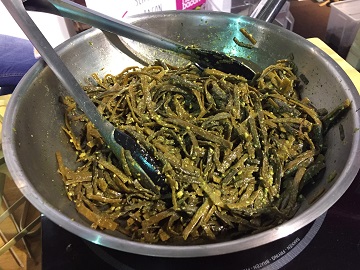The importance of healthy eating for our well-being is scientifically proven and having a varied diet goes without saying. Part of this are the so-called superfoods, which are exploding in popularity because of their antioxidant and anti-inflammatory properties, even if we must pay attention to sensationalist promises. In 2007 the EU banned the use of "superfood" on labels without a health claim that’s “clear, accurate and based on scientific evidence”, explaining why the food is good for the health of consumers.
Some superfoods appear quite exotic, things like Goji berries, quinoa or algae. Many companies are testing out new recipes, including these ingredients, to whet Western palates. Take the Irish start-up Seamore, for example. At this year’s edition of Seeds & Chips, a global food innovation summit, the company presented reinterpretations of traditional foods like Italian “tagliatelle” or English bacon, replacing pasta and pork with marine algae.

Seaweed "tagliatelle" pasta (Gianluca Dotti)
Founder and CEO Willem Sodderland explained that “in essence, seaweeds are a vegetable, but they contain nutrients absent in most vegetables, like Iodine and Omega-3. Indeed, fish get their Omega-3 from seaweed.” The three cold-water seaweeds studied by the start-up, namely the brown Himanthalia, the red Palmaria Palmata, which tastes like bacon, and the most known green variety have very little fat.
“There is a lot of isolated scientific research about the nutrition of seaweed, for example finding a connection between Japanese people becoming very old and the way they use algae,” said Sodderland. “Moreover, it is supposed that seaweed is able to change and create a better gut flora, which is essential for the absorption of all other nutrients. Unfortunately, outside Asia, seaweed is such an unknown food that scientific research has only just started.”
Don’t be fooled into thinking that superfoods are big and bulky. On the contrary, foods will be smaller and smaller in the future, because it is easier to assimilate. Some foods are called “super” because they are nutritionally dense and particularly rich in nutrients.
Bugs are some of the small superfoods – and are listed among the new worldwide trends.
But in Europe right now, only Belgium, Denmark, The Netherlands and the UK permit marketing and consumption of insects.
“Insects are nutritious and tasty, similar to crustaceans,” says Marco Ceriani, founder of the Italian start up Italbugs, “But the future of nutrition will not be about putting insects directly into your mouth as in Asian countries, rather using flours produced from insects.”
Insect food is hyper-proteinaceous. It is difficult to think that it will become competitive with other traditional food, but it could probably make it to market in specific areas such as sports-food, nutraceuticals and animal nutrition. “Among our products there is an insect powder containing 50 percent protein, consisting of crickets and flour larvae, packaged in ingestion capsules with beetroot and maca root,” says Ceriani.
The company also produces a “panettone” (traditional sweet bread loaf from Italy) made with silkworm flour. "It is called Panseta and contains up to 75 percent protein, thanks to a special flour produced with cooked silkworm”. It is the world's first experimental bread made with silkworm, with a reduced amount of fat. In the production process, the caterpillar is baked while still inside the bug, without ruining the silk cocoon.
Beyond “foreign” and experimental foods, there are many traditional foods that can be considered “super”. “Lentils, chickpeas, tomatoes, whole wheat, berries, nuts, yogurt and sardines are among the superfoods that we should eat frequently,” explains nutritionist biologist Elisabetta Bernardi, who collaborates with the well-known Italian scientific programme Superquark.
Moreover, there are foods that can affect brain functions more than others, from cognitive ability to memory, from learning to emotions. “Among nutrients not to be missed are folates found in dark green leafy vegetables, broccoli, citrus and eggs. They are very important for memory and verbal fluency,” continues Bernardi. “But it is equally important to avoid deleterious foods: a diet rich in saturated fats, sugars or calories can reduce cognitive functions. Overweight or obese adults have a greater risk of developing Alzheimer’s disease or senile dementia, and obesity is also linked to memory deficits.”
The impact of nutritional lipids on neuronal and cognitive performance in aging, Alzheimer’s disease and vascular dementia has been studied by the European project LidiDiDiet. The aim of the research was to analyse the link between some Omega-3 sources and the lowering of the risk of Alzheimer’s, to complement medical therapy with nutrition, especially in the early stages.
Additionally, after two years of research, a medical food in the form of a nutritional drink has also been developed. This daily beverage can help to conserve memory in people in the pre-dementia stage of Alzheimer’s disease, particularly within the brain area that stores short-term memories for long-term retrieval. The drink, presented last year, contains a specific combination of fatty acids and vitamins, and the positive effect has been proven by randomised clinical trials.
By Gianluca Dotti
10 August 2017
Cover photo: San
This article is part of the communication of the ProBIO project, a support action for KBBE projects which identifies research results to facilitate their uptake into the relevant sector.
